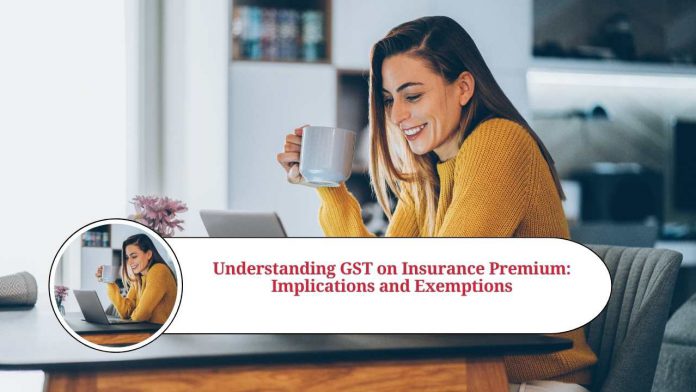Goods and Services Tax (GST) is a significant tax reform implemented in many countries, including India. It has also impacted the insurance industry, including insurance premiums. In this blog post, we will explore the concept of GST on insurance premiums, its implications for policyholders and insurance companies, as well as the exemptions and considerations to keep in mind.
What is GST on Insurance Premiums?
GST is a consumption-based tax levied on the supply of goods and services. In the case of insurance, GST is applied to the premium amount paid by policyholders. It is categorized under the financial services sector and is subject to specific rules and regulations.
Implications of GST on Insurance Premium:
- Increased Cost for Policyholders: The inclusion of GST on insurance premiums results in an increased cost for policyholders. The tax amount is added to the premium, making the overall price higher. This can impact individuals and businesses that rely on insurance coverage.
- Compliance Requirements for Insurance Companies: Insurance companies are responsible for collecting and remitting the GST on insurance premiums to the government. They need to ensure proper compliance with tax regulations, including timely filing of returns and accurate record-keeping.
Exemptions and Considerations:
- Life Insurance Premiums: Life insurance premiums, including term plans, endowment plans, and whole life insurance, are exempt from GST. These policies are not subject to tax, providing relief to individuals seeking life coverage.
- Health Insurance Premiums: Health insurance premiums are also exempt from GST. This exemption encourages individuals to secure comprehensive health coverage without the burden of additional taxation.
- Other Insurance Categories: Some insurance categories, such as motor insurance, property insurance, and travel insurance, are subject to GST. Policyholders should consider the GST implications when purchasing these types of insurance policies.
- Input Tax Credit (ITC): Insurance companies can claim Input Tax Credit (ITC) on the GST paid for various input services used in the course of their business operations. This helps offset the GST liability and reduces the overall tax burden on the insurers.
- Policyholders’ GST Registration: Policyholders are not required to have a GST registration solely for paying insurance premiums. However, businesses that claim ITC on insurance premiums may require GST registration to comply with tax regulations.
Conclusion:
GST on insurance premiums has brought about changes in the insurance landscape, affecting policyholders and insurance companies alike. While the tax increases the cost of insurance for certain categories, exemptions for life insurance and health insurance provide relief to individuals seeking crucial coverage. Policyholders need to understand the GST implications when purchasing insurance and for insurance companies to comply with the tax regulations. By staying informed about GST on insurance premiums, individuals and businesses can make informed decisions while ensuring financial protection and compliance with the prevailing tax laws.
Read more useful content:
Frequently Asked Questions:
Q1: What is GST on insurance premiums?
A1: GST on insurance premiums refers to the Goods and Services Tax levied on the amount of premium paid by policyholders for their insurance coverage. It is a consumption-based tax implemented in many countries, including India.
Q2: Are all insurance premiums subject to GST?
A2: No, not all insurance premiums are subject to GST. Life insurance premiums and health insurance premiums are exempt from GST. However, other insurance categories such as motor insurance, property insurance, and travel insurance are subject to GST.
Q3: How does GST on insurance premiums affect policyholders?
A3: GST on insurance premiums increases the overall cost for policyholders. The tax amount is added to the premium, making it higher. Policyholders should consider the impact of GST when purchasing insurance policies.
Q4: Are there any exemptions for life and health insurance premiums?
A4: Yes, life insurance premiums and health insurance premiums are exempt from GST. This exemption provides relief to individuals seeking life coverage and comprehensive health insurance.
Q5: What is Input Tax Credit (ITC) about GST on insurance premiums?
A5: Insurance companies can claim Input Tax Credit (ITC) on the GST paid for various input services used in their business operations. It helps offset the GST liability and reduces the overall tax burden on insurers.
Q6: Do policyholders need GST registration for paying insurance premiums?
A6: Policyholders are not required to have a GST registration solely for paying insurance premiums. However, businesses that claim Input Tax Credit (ITC) on insurance premiums may require GST registration to comply with tax regulations.
Q7: How should policyholders consider GST when purchasing insurance?
A7: Policyholders should consider the GST implications when purchasing insurance policies such as motor insurance, property insurance, and travel insurance. It is important to factor in the tax amount and understand the total cost of the premium.
Q8: Are there any compliance requirements for insurance companies regarding GST on insurance premiums?
A8: Yes, insurance companies have compliance requirements for GST on insurance premiums. They are responsible for collecting and remitting the GST to the government, filing returns, and maintaining accurate records to ensure proper compliance with tax regulations.
Q9: Can policyholders claim Input Tax Credit (ITC) on insurance premiums?
A9: No, policyholders cannot claim Input Tax Credit (ITC) on insurance premiums. Only insurance companies can claim ITC on the GST paid for input services used in their business operations.
Q10: Is GST on insurance premiums applicable in countries other than India?
A10: Yes, GST or similar consumption-based taxes may apply to insurance premiums in various countries. The specific rules and regulations may differ, so it is important to consult local tax authorities or insurance providers for the applicable tax laws in each country.





















